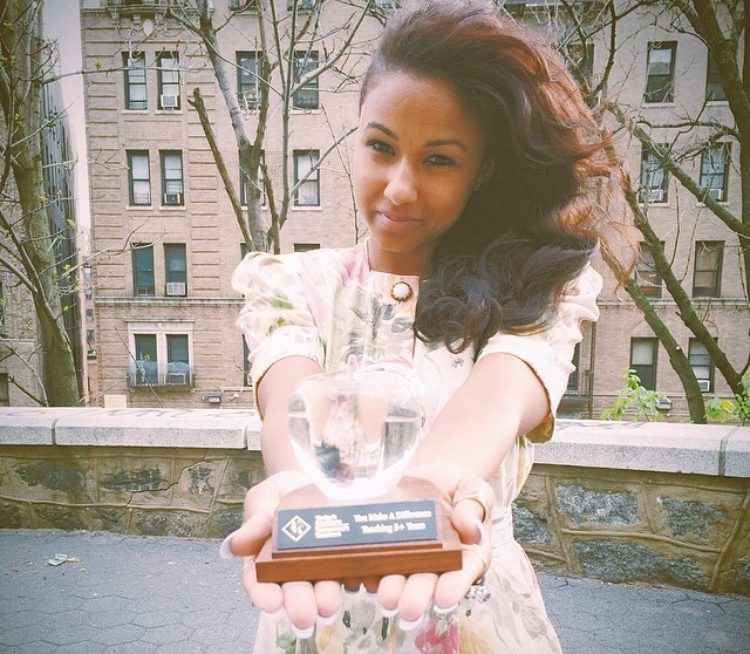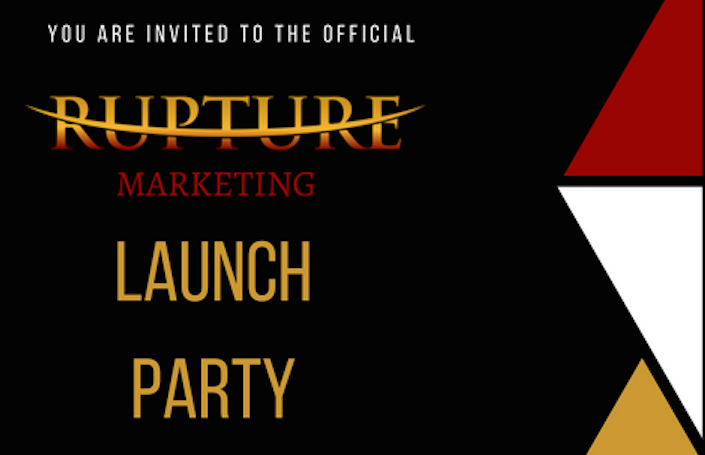Valencia D. Clay is a middle grades teacher of Humanities in Harlem, NY and a graduate of Morgan State University. During her tenure with Baltimore City Public Schools, she earned a Master’s in Special Education and a certification in Administration and Supervision from Johns Hopkins University.
Valencia is a co-founder of the Flourishing Blossoms Society for Girls, Inc., a global service mentoring program, and the author of Soundless Cries Don’t Lead to Healing: A Critical Thinking Guide Toward Cultural Consciousness. Through social media and her blog, ValenciasGarden.com, she is leading our generation to empower themselves through literacy and learning. Valencia has been recorgnized as an outstanding educator and we are excited to feature her in this week’s ShineHard conversation.
Johnny: What was your upbringing like?
Valencia: I started here. I was born in Harlem. My mom was in the streets and my dad was nowhere to be found. My grandmother, being the strong woman that she is, stepped in and took me in. Fortunately, she had an amazing boyfriend, who became my grandfather, and he told me to come upstate to White Plains, so I could go to school here. I was fortunate enough to be from Harlem, but get a Westchester education. It made me very well-rounded because I was able to get both sides of the spectrum. My childhood was typical of most children born in the 80s growing up in urban areas. There was a lot of dysfunction, but at the same time, a lot of love. I appreciate that about growing up with my grandmother. She was stern and I think that made me the woman I am today.

Johnny: What did you aspire to be when you grew up?
Valencia: A teacher! Always. At the age of five, I had a social worker and she told me that when I was little, I told her I wanted to be a teacher like my kindergarten teacher, Ms. Washington. I don’t remember saying it though. I can pinpoint moments where people would say to me, “What do you want to be?” and I would say a singer. I was afraid of competition and I didn’t think I was good enough. I knew that if I was a teacher, there was no one I would have to compete with. I would never fail. At five years old,I had it in my mind that teaching is a job that I can do in order to be able to survive, not knowing that it’s WAY bigger than that. “You were born to do this.” My sister and I would play school and I would be teaching her things on my chalkboard easel. We had a good time.

Johnny: How did your journey into the teaching field begin?
Valencia: I majored in Elementary Education. Even in high school, I was in a program called “Today’s Students, Tomorrow’s Teachers.” The decision was made and I didn’t want to do anything else. There was a moment where I was like, “I’m not just a teacher, but I’m also a servant.” I decided that this was what I was going to do this for the long haul when I finally passed my Praxis exam. It was so hard and I failed two or three times. The summer after I graduated from Morgan, I was working part-time at Best Buy when I got a call from someone at Hot 97. They gave me their card and I gave them my information. The day before the first day of school, they called me and wanted to give me a job as the manager of the street team, which was big for someone 21-22 years old. I chose teaching over that job because I already got my kids. I met my kids that would be in my very first class ever and I fell in love with them.

Johnny: What are you telling your students about your upbringing and instilling in them?
Valencia: My students know my story. They know about my mom. They know I don’t know my dad. They know how I was in high school. I don’t tell them just to say, “I made it. You can make it, too.” It’s really to say “Listen. I understand where you are right now.” Some days, they come to school and they don’t want to do anything. There was a time in my career where my empathy level was so low and I would say, “No, you’re going to do this work.” Now, I can take a moment to draw back and say, “What’s the problem? What’s going on?” I needed those things when I was I child and didn’t have them. As a teacher now, I can look back and say that they were probably going through the same things we were going through. Pressure as a child is so different than the pressure of an adult. You don’t know what they’re seeing and going through when they go home. I’ve had to learn to be more empathetic. I have seen changes in how my students react towards me, other teachers, and their peers by changing my approach.

Johnny: There is a disparity between black educators and black students. Why do you think that is?
Valencia: There are so many reasons why. If you look at right now, 18 percent of our teachers in the nation are African American. Two percent are men. People are always asking me, “Do you think we need to have more Black teachers in the classroom?” Absolutely. Not just because these children are Black, but because teaching is a lifelong learning experience. As a teacher, I’m reading and learning more than I ever have. A lot of people make the mistake and say that teachers don’t get a lot of money, and Black people want to be in fields that make money. That’s not true. We don’t glorify being educators in the way that we used to. Some say that it doesn’t look fun and that they don’t have patience for kids in 2016. You can mold them to the way that you want them to be.
Johnny: What’s the motivation for your social media platform?
Valencia: The more that people see that teaching doesn’t look like what it looked like when they were in school, that you can make your classroom your art, and that this isn’t just a 9-5, it changes their perspective and gets them thinking, “Hmm. I can do that.” It started just as one of my kids that just couldn’t sit still. I wanted to him to still pay attention to me without taking attention away from him. A lot of teachers give so much attention to the kids that are troublesome and that doesn’t help the rest of the class. I just told him to record me one day. He was still paying attention to me without it feeling like he was an outcast for not being able to sit still.

Johnny: The staple of this project is “Passion changes everything.” What would you say is your passion and when did you know?
Valencia: I don’t have a passion. I am passionate. When I say that, what I mean is anything I’m doing, I’m passionate about it. If I’m in my classroom and I’m teaching my kids how to read, I’m passionate about that. Or if I’m in a meeting with educators, and I’m telling them that what they are doing is not working for our kids and that we need to try something else, I’m passionate about that. I struggle with that in a way because I’m fighting myself when I do that. When I fight like that, I’m the only one sometimes. It makes me feel “Was I wrong for speaking out? Was I wrong for walking out of that meeting with an attitude?” Those are those moments where I feel like I’m passionate and I’m not going to apologize. I can’t say I have one passion. Everything I do, I pour my passion into it. The only label that I take is teacher.

Johnny: What is your biggest fear?
Valencia: Fear? What is fear? I don’t have a fear. There is no good reason to fear anything. I understand the word, but it’s not something that exists to me. I felt fear when I wasn’t awakened…when I was a victim and not a visionary. When I was a victim, I was fearing- “Nobody’s going to love me. I’m not good enough. I can’t pass this test. I’m not smart enough. I’m not going to get into this school.” Those were the “victim” fears. I’m a visionary now. There’s no such thing as fear. I don’t see anything as fear. Things that bother me or come against me aren’t trying to hurt me- they’re going to enhance who I am. It’s going to strengthen me and make me grow.

Johnny: What does it mean to be conscious?
Valencia: To be aware and mindful on a level that doesn’t distract you. A lot of times there’s a curse that comes with being conscious because you see things you have to act on, even if you feel like you don’t have time. For instance, when things are happening in the real world, I have to come to my classroom and say, “You all can’t even read. How am I going to make you young activists?” I then have to choose what’s more important. I feel like it’s my duty on a conscious level to act and I have to teach them the same thing. We really don’t realize the difference being emotional and being conscious. When we are looking at these things and we’re angry about them, that is our emotions- our anger, our confusion, us feeling like we need to break the chains. Once we turn our emotions off, we start to act on our conscious level, which says that we need to work with other people to figure out how we’re going to change things together.
Johnny: What’s the conversation like with your students? How do you make sure they’re conscious but educated at the same time?
Valencia: I start out not in the conversation. I facilitate and allow them to talk amongst themselves. As I’m listening to them, I choose things that they are saying that I need to touch on. Our latest conversation I had to touch on generalizations they were making. When they look at us and say “You’re all thugs. You can’t get into a good school. You only got into that school because of affirmative action” and we turn around and say, “White cops are all racist. They don’t care about us”, we are mirroring what they are doing to us. A lot of times, people say there is no such thing as reverse racism. Yes, there is! That word was founded upon people who went and did something to another group, and we have picked up some of those same things. It’s just the nature of our community right now. The only way to shift it is to first be able to admit it and then talk about it.

Johnny: What is the greatest piece of advice you can give to aspiring educators?
Valencia: Teach from the heart. That simply means when you go into your classroom, everything you do should be from your heart. Be yourself and love. When you are being yourself, you are being true to your heart. Don’t try to emulate anyone else. Remember why you started. When your kids see that it’s what you genuinely want to do for them, you will get respect and love from them. They will work hard for you. You aren’t always going to have easy days. These are real people with real issues. If you’re looking at them through the heart’s eyes, you won’t get as angry and personalize their behavior. The heart remembers to put their heart first.




